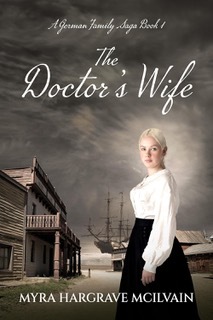
Myramcilvain
The Doctor's Wife.
My Award Winning Novel.
Young teacher Amelia Anton leaves Germany in 1845 on an immigrant ship bound for Texas. After the death at sea of the child she is hired to tutor, her employer abandons her. Amelia quickly accepts the marriage proposal of the much-respected physician, Joseph Stein, only to discover that he is not the husband she expected.
“…immersive historical prequel portrays the birth of a Texas town through the eyes of a young immigrant….McIlvain has a historian’s eye for detail, a good ear for dialogue, and a fascination with the political machinations that affect the tiny town’s growth, including unflinching engagement with the inhuman institution of slavery.” ––Kirkus Review––
Click these links for review and get the book at all your favorite retailers.
See the Book Trailer below:
Excerpts:
November 5, 1845
Dear Papa and Helga, doors open and close…
The ship’s gangplank slid into the fog obscuring the Galveston dock. Amelia Anton scooped Frau Regina von Ewald up in her arms, practically carrying the grieving woman.
n as they made their way down the narrow wood walkway onto the pier. Herr von Ewald ignored then both, shoving ahead to the waiting carriage. The hood of Amerlia’s cape protected her blonde braids from the chill and offered a hidden place from which to stare at black men who appeared and disappeared into the mist, heaving bales of cotton off a nearby freight wagon. The heavy air muted their slow work song and sweat drenched their ragged clothing, even in the bone-aching cold. Southern slavery–as described in the immigrant guide books––had been one of her first lesson for her pupil, young Otto.
The boy’s papa, Amelia’s turnip-shaped employer, clambered into the enclosed carriage without turning back to look for his wife, the dear lady responsible for Amelia being hired. Her reason for being in this strange land––as the boy’s private tutor–had died along with her student. Amelia, shuddering at the thought that she may have made a huge mistake, pulled her cape tight against her body and glanced through the back window of the carriage toward the mournful sound of slaves, invisible in the white haze.
* * *
Fraulein Amelia.” Dr. Stein had turned a deep crimson. He sucked in his breath like a man about to plunge into deep water. “I had planned to court you. I started my first letter as soon as we sailed from here.” His fingers, which looked too slender to fit his massive frame, spread across his chest, patting the rumpled breast of his black coat. “Circumstances have changed for both of us.” Joseph Stein hunched forward, his hand still pressing the pocket holding his letter.
* * *
The evening sky was black, offering not a single star to guide the settlers’ Holy Christmas. A rich tenor voice began quietly, then a chorus of male voices joined in, filling the air with Stille Nacht. Adults and children began pouring out of the tents holding flickering candles. Voices rose, drawing throngs onto the shore to join the heavenly sound. Candles, glowing on the faces of smiling children and tear-streaked adults, shut out the sight of the dingy tents and the cactus-plagued prairie. Only the music and the voices mattered. They were home again.
Then, like the crescendo of an organ in a great cathedral, thunder crashed, and a streak of lightning lit the prairie, igniting a clump of cactus. The skies opened with a deluge of rain that snuffed out the candles and drove the shrieking sojourners to their only protection—the stinking, crowded tents.
* * *
On the morning in late February when the oxcart driver delivering the Texian Advocate arrived yelling, “The war’s over!” he was mobbed by the families surging out of the tents, following him to the store, demanding details.
Amelia heard the commotion and rushed to meet him on the porch.
“Tell us what it says,” sounded in full chorus from the sea of haggard tear-stained faces gazing at Amelia.
I feel like the town crier. Thank the Lord this is good news. She grabbed the paper and read as loud as she could shout, “The Treaty of Guadalupe Hidalgo, which ended the war, was signed on February second. The men should be returning soon.”
The roar was deafening. Frau Fischer who had come on a run, her morning coat hanging loose below her heavy winter shawl, elbowed her way to the edge of the porch. She threw her arms around a heavy woman with spikes of black whiskers on her chin and teeth like kernels of corn. The two cried and beat each other on the back. Men began leaping on the porch and taking turns grabbing Amelia to dance her in circles.